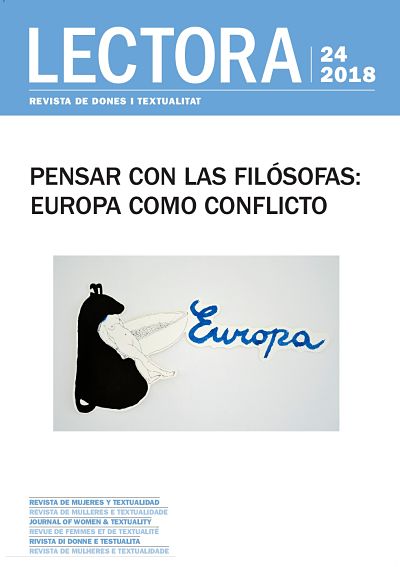The Cosmopolitan Europe of Seyla Benhabib: Conflict, Difference and Citizenship
DOI:
https://doi.org/10.1344/Lectora2018.24.8Keywords:
Seyla Benhabib, cosmopolitanism, Europe, citizenship, conflictAbstract
Seyla Benhabib's idiosyncratic approach provides an original framework for a complex characterization of the paradoxes of contemporary Europe, and the dialectic between identity and citizenship within. This essay analyses Benhabib's approach through three main elements: the lessons of the totalitarian moment, the relationship between Europe and its "others" in recent history, and the potential of certain cosmopolitan elements catalyzed by the EU project. This type of analysis makes explicit a look "from the margins", which marks Benhabib's particular contribution to the critical theory of democracy and to its dialogue with Enlightenment universalism.
References
Agra, Maria Xosé (2000), "Multiculturalismo, justicia y género", Feminismo y
filosofía, Celia Amorós (ed.), Madrid, Síntesis: 135-164.
Álvarez, David (2003), Cosmopolitismo, multiculturalismo y tolerancia: Aspectos
normativos de la justicia internacional, Santiago de Compostela, Universidade
de Santiago de Compostela.
Álvarez, Silvina y Cristina Sánchez (2001), Feminismos, debates teóricos
contemporáneos, Madrid, Alianza.
Amorós, Celia (coord.) (1994), Historia de la teoría feminista, Madrid, Comunidad de Madrid, Dirección General de la Mujer: 241-256.
Arendt, Hannah (1996), Entre el pasado y el futuro: Ocho ejercicios sobre la
reflexión política, Barcelona, Península.
—(2006), Los orígenes del totalitarismo, Madrid, Alianza.
Beltrán, María Elena y Cristina Sánchez (coords.) (1996), Las ciudadanas y lo
político, Madrid, Universidad Autónoma de Madrid: 21-42.
Benhabib, Seyla (1986), Critique, Norm, and Utopia. A Study of the Normative
Foundations of Critical Theory, Nueva York, Columbia UP.
—(ed.) (1996), Democracy and Difference. Contesting the Boundaries of the
Political, Princeton, Princeton UP.
—(2000), Diversitat cultural, igualtat democràtica: La participació política en l’era de la globalització, Valencia, Tàndem.
—(2003), The Reluctant Modernism of Hannah Arendt, Oxford, Rowman &
Littlefield Publishers. [1996]
—(2005), Los derechos de los otros. Extranjeros, residentes y ciudadanos, Barcelona, Gedisa. [2004]
—(2006a), El Ser y el Otro en la ética contemporánea. Feminismo, comunitarismo y posmodernismo, Barcelona, Gedisa. [1992]
—(2006b), Las reivindicaciones de la cultura. Igualdad y diversidad en la era global, Buenos Aires, Katz Editores. [2002]
—(2006c), Another Cosmopolitanism: Hospitality, Sovereignty, and Democratic
Iterations, Robert Post (ed.), Oxford, Oxford UP.
—(2011), Dignity in Adversity. Human Rights in Troubled Times, Cambridge,
Polity.
—(2013a), "Reason-Giving and Rights-Bearing: Constructing the Subject of
Rights", Constellations, 20, 1: 38–50.
—(2013b), "Transnational Legal Sites and Democracy-Building: Reconfiguring
Political Geographies", Philosophy and Social Criticism, 39, 4-5: 471–486.
—(2013c), "Ethics without Normativity and Politics without Historicity. On
Judith Butler's Parting Ways. Jewishness and the Critique of Zionism", Constellations, 20, 1: 150-163.
—(2013d), "Human Rights, International Law and the Transatlantic Rift", The
Democratic Disconnect. Citizenship and Accountability in the Transatlantic
Community, Seyla Benhabib et al. (eds.), Washington, Transatlantic Academy:
89-100.
—(2013e), Equality and Difference. Human Dignity and Popular Sovereignty in the Mirror of Political Modernity, Tübingen: Mohr Siebeck.
—(2014), "The New Legitimation Crises of Arab States and Turkey", Philosophy
and Social Criticism, 40, 4-5: 349–358.
—(2015), "The Right to Justification by Rainer Forst: The Uses and Abuses of
Kantian Rigorism. On Rainer Forst’s Moral and Political Philosophy", Political
Theory, 43, 6: 777–837.
—(2017), "Turkey Is about to Take another Step toward Dictatorship", The
Washington Post, 16/03/2017. <https://www.washingtonpost.com/news/demo
cracy-post/wp/2017/03/16/turkey-is-about-to-take-another-steptowarddictato
rship/?noredirect=on&utm_t erm=.b1d333bdcc9d>
Benhabib, Seyla y Drucilla Cornell (eds.) (1990), Teoría feminista y teoría crítica,
Valencia, Alfons el Magnànim.
Birulés, Josefina (comp.) (2000), Hannah Arendt: El orgullo de pensar, Barcelona, Gedisa.
Campillo, Neus (1997), El feminisme com a crítica, Valencia, Tándem.
—(2006), "Seyla Benhabib", Veinte pensadoras del siglo XX, María José Guerra y Ana Hardisson (eds.), Oviedo, Nobel: 127-146.
Cruz, Manuel (2007), "Con Arendt, contra Arendt: Entrevista con Seyla Benhabib", Letras libres, 67: 58-60.
Guerra, María José (1997), "¿'Subvertir' o 'situar' la identidad? Sopesando las
estrategias feministas de Judith Bulter y Seyla Benhabib", Daimon, 14: 143-154.
—(1999) "Mujer, identidad y espacio público", Contrastes, 4: 45-64.
Michelman, Frank (1988), "Law’s Republic", Yale Law Journal, 97, 8: 1493-1537.
Sánchez, Cristina (2009), "Seyla Benhabib: Hacia un universalismo interactivo y
globalizado", Teorías políticas contemporáneas, Ramón Máiz (coord.),
Valencia, Tirant lo Blanch: 271-310.
Velasco, Juan Carlos (2016), El azar de las fronteras: Políticas migratorias,
ciudadanía y justicia, México, Fondo de Cultura Económica.
Downloads
Published
How to Cite
Issue
Section
License
The Author retains ownership of the copyright in this article and grants Lectora: revista de dones i textualitat the rights to print publication of the Article. The work will be available under a Creative Commons Attribution-Noncommercial-No Derivative Works license, by which the article must be credited to the Author and the Journal be credited as first place of publication.
The Author is free to enter in seperate, additional contractual agreements for the non-exclusive distribution of the work as published in this journal (such as institutional repositories or a book), as long as the original publication in Lectora is credited.
The Author is encouraged to post the work online (eg in institutional or thematic repositories, or in their website), as it can lead to productive exchanges as well as to a greater citation of the published work (see The Effect of Open Access).




